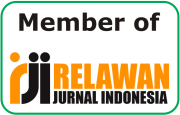Reflection on Monotheism in QS. Ali-Imran Verses 31, 59, and 128 (Thematic Study Based on Asbābun Nuzūl)
Abstract
Understanding the historical context of the revelation of the verses of the Qur'an, or what is known as asbābun nuzūl, plays an important role in revealing the theological messages contained therein. Surah Ali 'Imran is one of the surahs that contains profound values of monotheism, spread across several verses that have different backgrounds of revelation. The purpose of this study is to examine the values of monotheism contained in QS Ali 'Imran verses 31, 59, and 128 using the asbābun nuzūl approach, and to explore the dimensions of monotheism in these verses more contextually. This study uses a qualitative method with a descriptive-analytical approach. Analysis was carried out on classical and contemporary sources of interpretation to identify the form of monotheism contained in each verse. The results of the study show that verse 31 contains the teaching of monotheism ulūhiyyah, namely that true love for Allah must be realized through obedience to the Prophet Muhammad. Verse 59 reflects the monotheism of rubūbiyyah, with the assertion that only Allah has full authority as the creator and regulator of the universe. Meanwhile, verse 128 shows the asmāʾ wa ṣifāt dimension of monotheism, with an emphasis on the nature of Allah as the Most Forgiving (al-Ghafūr) and that all decrees belong to Him. Thus, these three verses show that the values of monotheism in Surah Ali 'Imran can be understood more fully and deeply through the asbābun nuzūl approach, which reveals the historical and theological dimensions of revelation.
Keywords
Full Text:
PDFReferences
Afrizal, Lalu Heri. “Rubūbiyah dan Ulūhiyyah Sebagai Konsep Tauhid (Tinjauan Tafsir, Hadits dan Bahasa).” Tasfiyah 2, no. 1 (2018): 41. https://doi.org/10.21111/tasfiyah.v2i1.2482.
Ahmad Razali Sinaga, Dedi Masri, Muhammad Alfiansyah, Khairunnisa Khairunnisa, and Ayu Vika Lestari. “Peran Asbabun Nuzul Qur’an Surah Ali Imran Ayat 159 Dalam Metode Pembelajaran Bagi Mahasiswa/i Pendidikan Bahasa Arab Stambuk 2020.” Al Fuadiy : Jurnal Hukum Keluarga Islam 5, no. 1 (2023): 01–09. https://doi.org/10.55606/af.v5i1.391.
Anhar. “Tauhid Uluhiyah.” Al-Mubarak Jurnal Kajian Al-Qur’an Dan Tafsir 4, no. No 2 (2019).
Fathullah Zarkasyi, Amal. Konsep Tauhid Ibn Taymiyyah Dan Pengaruhnya Di Indonesia. Cet. 1. Jami’ah Darussalam dan Darussalam University Press, 2010.
Hakam Chozin, Fajrul. Cara Mudah Menulis Krya Ilmiah. Alpha Grafika, n.d.
Hayati, Safira Malia. Nama dan Sifat (Asma' wa Sifat) serta Personifikasi Tuhan dalam Kitab Suci: Analisis Studi Komparasi. 3, no. 2 (2022).
Indra, AlKadri, and Hadari. “Makna Tauhid Menurut Ibnu Katsir (Kajian QS. Al An’am Ayat 17-19).” Jurnal Ilmiah Falsafah, Jurnal Kajian Filsafat, Teologi Dan Humaniora Vol 10, no. No 2 (2024). https://doi.org/10.37567/jif.v10i2.2672.
Khairina, Viani. Relevansi Pemahaman Q.S. Ali 'Imran Ayat 31 dengan Penanaman Nilai Cinta Rasulullah SAW. di Ma'had Tahfidz Qur'an Darussalam. n.d.
Marlion, Ferki Ahmad, and Tri Yuliana Wijayanti. “Makna Ayat-ayat Perumpamaan Di Dalam Surat Ali Imran.” An-Nida’ 43, no. 2 (2019): 125. https://doi.org/10.24014/an-nida.v43i2.12320.
Mukhlis, Imam. “Makna Ayat-Ayat Teguran Terhadap Nabi Muhammad SAW (Studi Analisis Surat Ali Imran: 128, Al-Anfal: 67, Al-Taubah: 43, dan Al-Kahfi: 23-24.” Jurnal Tafsere 10, no. 2 (2022): 133–53. https://doi.org/10.24252/jt.v10i2.35564.
Muttaqin, Muhamad Zaenal, and IAIN Syekh Nurjati. Maḥabbah in Perspective of Sufistic Interpretation. 7 (2021).
Nisaburi, Al-Wahidi, and Moh. Syamsi. Asbabun Nuzul, Sebab-Sebab Turunnya Ayat-Ayat Al-Qur’an. Cet. 1. Amelia, 2014.
Qayyim Al-Jauziyah, Ibn. Madarijus-Salikin (Pendakian Menuju Allah), Penjabaran Kongkret “Iyyaka Na’budu Wa Iyyaka Nasta’in.” Cet. 2. Pustaka Al-Kautsar, 1999.
Qonita, and Anisa Maulidya. “Asbabun Nuzul: Urgensinya dalam Memahami Kontekstual Ayat Alquran.” Jurnal Studi Ilmu Alquran dan Tafsir 1, no. 1 (2024). https://doi.org/10.47134/jsiat.v1i1.116.
Sari, Citra Ayu Wulan, Nabila Hafsyah, Kalisa Fazela, Putri Nayla, and Wismanto Wismanto. “Pemahaman Pentingnya Tauhid dalam Kehidupan Umat Islam.” MARAS: Jurnal Penelitian Multidisiplin 2, no. 1 (2024): 293–305. https://doi.org/10.60126/maras.v2i1.177.
Sayyida, Sayyida. “Ayat-Ayat Tauhid terhadap Budaya Pemeliharaan Keris di Jawa (Studi Kasus Buku M.T. Arifin).” Journal of Qur’an and Hadith Studies 6, no. 1 (2019): 24–52. https://doi.org/10.15408/quhas.v6i1.13403.
Sofia, Wida Nafila. “Interpretasi Imam Al-Maraghi dan Ibnu Katsir Terhadap Qs. Ali Imran Ayat 190-191: Imam Al-Maraghi and Ibn Kathir’s Interpretation of Qs. Ali Imran Verses 190-191.” Tafkir: Interdisciplinary Journal of Islamic Education 2, no. 1 (2021): 41–57. https://doi.org/10.31538/tijie.v2i1.16.
Subhi As-Shalih. Membahas Ilmu Hadis. Pustaka Firdaus, 2009.
Suyuthi, Imam, and Andi Muhammad Syahril. Asbabun Nuzul, Sebab-Sebab Turunnya Ayat Al-Qur’an. Cet. 1. Pustaka Al-Kautsar, 2014.
Tanjung, Alwin Tanjung. “Memahami Esensi Tauhid Melalui Al-Qur’an.” Al-Kauniyah 4, no. 2 (2023): 87–97. https://doi.org/10.56874/alkauniyah.v4i2.1669.
Tanjung, Alwin Tanjung. “Memahami Esensi Tauhid Melalui Al-Qur’an.” Al-Kauniyah 4, no. 2 (2023): 87–97. https://doi.org/10.56874/alkauniyah.v4i2.1669.
Tanjung, Alwin Tanjung. “Memahami Esensi Tauhid Melalui Al-Qur’an.” Al-Kauniyah 4, no. 2 (2023): 87–97. https://doi.org/10.56874/alkauniyah.v4i2.1669.
Ulum, Itah Miftahul. Konsepsi Tauhid Menurut Muhammad bin Abdul Wahab dan Implikasinya bagi Tujuan Pendidikan Islam. n.d.
Umar Al-Zamakhsyari, Abi Qasim Mahmud. Tafsir Al-Kasyaf. Cet. 1. Juz 1. Maktabah Al-’Abikan, 1998.
Unaisyah, Adhenur, Cahaya Putri Lusnia, Alfatihah Rizka, Afina Wahyuri, Tria Putri, and Alya Septina. Menggali Konsep Cinta: Tafsir Surah Ali Imran Ayat 31 dalam Fi Zilalil Qur'an. n.d.
Zuhaili, Wahbah. Tafsir Al-Munir. Jilid 1, Juz 2. Gema Insani, 2013.
Zulfikar, Eko. “Relasi MahabbahMenurut QS. Ali ‘Imran [3]: 31 dengan Pancasila sebagai Ideologi Negara: Studi Pemikiran Imam al- Ghazali Dalam Kitab Mukasyafatal-Qulub.” . . Volume 01 (2022).
DOI: http://dx.doi.org/10.35931/aq.v19i5.5038
Refbacks
- There are currently no refbacks.
Copyright (c) 2025 Hafidh Dinul Kholis, Masruhan Masruhan Masruhan, Yossi Kurnia Yudatama, Miftahul Huda

This work is licensed under a Creative Commons Attribution 4.0 International License.
Al Qalam: Jurnal Ilmiah Keagamaan dan Kemasyarakatan
index by:
Publish by:
Sekolah Tinggi Ilmu Al-Qur'an Amuntai
Contact us:
Address: Jl. Rakha Pakapuran, Amuntai Utara
Kabupaten : Hulu Sungai Utara
Kode Pos : 71471
Provinsi : Kalimantan Selatan
Telephone : 085251613000
Email: hafizhihusinsungkar@gmail.com

This work is licensed under a Creative Commons Attribution 4.0 International License


